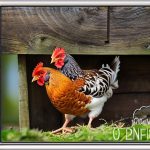Keeping quails with chickens has become increasingly popular among poultry keepers. Both species are ground-dwelling birds that can share a common environment, making them suitable for cohabitation. Quails are characterized by their small size, docile nature, and egg-laying ability, while chickens are larger, more social, and also valued for their egg production.
When housed together, quails and chickens can offer complementary benefits in areas such as foraging, pest management, and egg yield. However, integrating these two species requires careful consideration of their distinct housing and nutritional needs, as well as an understanding of the potential advantages and challenges associated with their coexistence. Successful integration of quails and chickens depends on implementing appropriate strategies to address these factors.
Table of Contents
- 1 Differences in Housing and Feeding Requirements
- 2 Potential Benefits of Keeping Quails with Chickens
- 3 Potential Challenges and Risks
- 4 Tips for Introducing Quails to a Chicken Flock
- 5 Monitoring and Managing the Quail-Chicken Dynamic
- 6 Conclusion and Final Considerations
- 7 FAQs
- 7.1 Can you keep quails with chickens?
- 7.2 What are the benefits of keeping quails with chickens?
- 7.3 Are there any potential issues with keeping quails with chickens?
- 7.4 How can I ensure the well-being of both quails and chickens in the same enclosure?
- 7.5 What should I consider before keeping quails with chickens?
Key Takeaways
- Keeping quails with chickens can be a beneficial and rewarding practice for poultry enthusiasts.
- Quails have different housing and feeding requirements compared to chickens, requiring separate spaces and specialized diets.
- Potential benefits of keeping quails with chickens include pest control, increased egg production, and a diverse and dynamic flock.
- Potential challenges and risks of keeping quails with chickens include aggression, disease transmission, and competition for resources.
- When introducing quails to a chicken flock, it is important to do so gradually and monitor their interactions closely to ensure a smooth integration.
Differences in Housing and Feeding Requirements
Housing Requirements
Quails are smaller and more delicate than chickens, requiring a secure and well-ventilated coop to protect them from predators and harsh weather conditions. Additionally, quails prefer to roost off the ground, so providing elevated perches or platforms in the coop is essential for their comfort and safety.
Feeding Requirements
In terms of feeding, quails have specific dietary needs that differ from those of chickens. They require a higher protein diet, typically provided in the form of game bird feed or a mix of seeds, grains, and insects. Quails also need access to grit for digestion and calcium supplements for egg production.
Comparing Quails and Chickens
On the other hand, chickens are more adaptable to various coop designs and can roost on the ground or in elevated spaces. They have a lower protein requirement compared to quails and can thrive on a diet of layer feed, supplemented with kitchen scraps, grains, and insects. Understanding these differences in housing and feeding requirements is crucial for successfully keeping quails with chickens.
Potential Benefits of Keeping Quails with Chickens

There are several potential benefits to keeping quails with chickens. One of the main advantages is the complementary foraging behavior of these two species. Quails are ground-dwelling birds that are skilled at finding and consuming small insects, seeds, and vegetation.
When kept with chickens, they can help control pests such as ticks, mites, and small insects in the coop and surrounding areas. Additionally, quails are prolific egg layers, producing small but nutritious eggs that can supplement the larger eggs laid by chickens. This can be particularly beneficial for small-scale poultry keepers who are looking to diversify their egg production.
Furthermore, quails are known for their gentle nature and low impact on the environment, making them suitable companions for chickens in a mixed poultry flock. Overall, keeping quails with chickens can enhance pest control, egg production, and the overall dynamics of a poultry flock. There are several potential benefits to keeping quails with chickens.
One of the main advantages is the complementary foraging behavior of these two species. Quails are ground-dwelling birds that are skilled at finding and consuming small insects, seeds, and vegetation. When kept with chickens, they can help control pests such as ticks, mites, and small insects in the coop and surrounding areas.
Additionally, quails are prolific egg layers, producing small but nutritious eggs that can supplement the larger eggs laid by chickens. This can be particularly beneficial for small-scale poultry keepers who are looking to diversify their egg production. Furthermore, quails are known for their gentle nature and low impact on the environment, making them suitable companions for chickens in a mixed poultry flock.
Overall, keeping quails with chickens can enhance pest control, egg production, and the overall dynamics of a poultry flock.
Potential Challenges and Risks
While there are potential benefits to keeping quails with chickens, there are also challenges and risks that need to be considered. One of the main challenges is the potential for aggression between quails and chickens. Chickens can be territorial and may exhibit aggressive behavior towards smaller birds such as quails, especially during feeding time or when establishing a pecking order within the flock.
This can result in injury or stress for the quails if not managed properly. Additionally, quails have specific housing and dietary requirements that may differ from those of chickens, requiring careful planning and management to ensure their well-being. Another risk is the potential for disease transmission between quails and chickens.
While both species are susceptible to certain poultry diseases, they may have different immune responses or carrier statuses for specific pathogens. Introducing new birds into an existing flock can increase the risk of disease transmission if proper quarantine measures are not followed. Understanding these potential challenges and risks is essential for successful integration of quails with chickens.
While there are potential benefits to keeping quails with chickens, there are also challenges and risks that need to be considered. One of the main challenges is the potential for aggression between quails and chickens. Chickens can be territorial and may exhibit aggressive behavior towards smaller birds such as quails, especially during feeding time or when establishing a pecking order within the flock.
This can result in injury or stress for the quails if not managed properly. Additionally, quails have specific housing and dietary requirements that may differ from those of chickens, requiring careful planning and management to ensure their well-being. Another risk is the potential for disease transmission between quails and chickens.
While both species are susceptible to certain poultry diseases, they may have different immune responses or carrier statuses for specific pathogens. Introducing new birds into an existing flock can increase the risk of disease transmission if proper quarantine measures are not followed. Understanding these potential challenges and risks is essential for successful integration of quails with chickens.
Tips for Introducing Quails to a Chicken Flock
Introducing quails to a chicken flock requires careful planning and management to ensure a smooth transition for both species. One important tip is to provide separate but adjacent living spaces for the quails and chickens initially. This allows them to become familiar with each other’s presence without direct physical contact, reducing the risk of aggression or stress during the introduction phase.
Gradually introducing quails to the chicken flock during free-ranging time can also help them acclimate to each other’s presence in a neutral environment. It’s important to monitor their interactions closely during this period and intervene if any aggressive behavior is observed. Providing multiple feeding stations and water sources can also help minimize competition between quails and chickens during meal times.
Additionally, offering enrichment activities such as dust baths or scattered treats can help divert their attention away from potential conflicts. Introducing quails to a chicken flock requires careful planning and management to ensure a smooth transition for both species. One important tip is to provide separate but adjacent living spaces for the quails and chickens initially.
This allows them to become familiar with each other’s presence without direct physical contact, reducing the risk of aggression or stress during the introduction phase. Gradually introducing quails to the chicken flock during free-ranging time can also help them acclimate to each other’s presence in a neutral environment. It’s important to monitor their interactions closely during this period and intervene if any aggressive behavior is observed.
Providing multiple feeding stations and water sources can also help minimize competition between quails and chickens during meal times. Additionally, offering enrichment activities such as dust baths or scattered treats can help divert their attention away from potential conflicts.
Monitoring and Managing the Quail-Chicken Dynamic

Monitoring Interactions and Intervening When Necessary
Once quails have been successfully introduced to a chicken flock, it’s essential to monitor their dynamic on an ongoing basis to ensure their well-being and harmonious cohabitation. Regular observation of their interactions during feeding time, roosting hours, and free-ranging activities can provide valuable insights into their social dynamics and any potential conflicts that may arise. It’s crucial to intervene promptly if any aggressive behavior is observed, such as pecking or chasing between quails and chickens.
Providing a Comfortable Living Environment
Providing ample space within the coop and run area can also help minimize competition for resources and reduce stress among the birds. Additionally, offering separate nesting boxes or areas for egg laying can help prevent disputes over nesting sites between quails and chickens.
Promoting Peaceful Coexistence
By actively monitoring their interactions and managing their living environment, poultry keepers can promote a peaceful coexistence between quails and chickens. This requires ongoing attention and adjustments to ensure the well-being of all birds in the flock.
Conclusion and Final Considerations
In conclusion, keeping quails with chickens can offer several benefits such as enhanced pest control, diversified egg production, and improved dynamics within a mixed poultry flock. However, it’s important to consider differences in housing and feeding requirements, potential challenges and risks, as well as strategies for successful integration when embarking on this endeavor. By providing separate living spaces initially, gradually introducing quails to the chicken flock, monitoring their interactions closely, and managing their dynamic on an ongoing basis, poultry keepers can promote a harmonious cohabitation between these two species.
With careful planning and attentive management, keeping quails with chickens can be a rewarding experience that adds diversity and vitality to a poultry operation. In conclusion, keeping quails with chickens can offer several benefits such as enhanced pest control, diversified egg production, and improved dynamics within a mixed poultry flock. However, it’s important to consider differences in housing and feeding requirements, potential challenges and risks, as well as strategies for successful integration when embarking on this endeavor.
By providing separate living spaces initially, gradually introducing quails to the chicken flock, monitoring their interactions closely, and managing their dynamic on an ongoing basis, poultry keepers can promote a harmonious cohabitation between these two species. With careful planning and attentive management, keeping quails with chickens can be a rewarding experience that adds diversity and vitality to a poultry operation.
If you’re considering keeping quails with chickens, you may also be interested in learning about how many eggs geese lay. Check out this article on poultrywizard.com to find out more about geese breeding and egg production.
FAQs
Can you keep quails with chickens?
Yes, it is possible to keep quails with chickens in the same coop or enclosure.
What are the benefits of keeping quails with chickens?
Keeping quails with chickens can provide a diverse and interesting flock, as well as potential pest control benefits.
Are there any potential issues with keeping quails with chickens?
There may be potential issues with aggression between the quails and chickens, as well as differences in dietary needs.
How can I ensure the well-being of both quails and chickens in the same enclosure?
Providing enough space, separate feeding areas, and monitoring for any signs of aggression or stress can help ensure the well-being of both quails and chickens in the same enclosure.
What should I consider before keeping quails with chickens?
Before keeping quails with chickens, it is important to consider the space requirements, potential for aggression, and the specific needs of both quails and chickens.
Meet Walter, the feathered-friend fanatic of Florida! Nestled in the sunshine state, Walter struts through life with his feathered companions, clucking his way to happiness. With a coop that’s fancier than a five-star hotel, he’s the Don Juan of the chicken world. When he’s not teaching his hens to do the cha-cha, you’ll find him in a heated debate with his prized rooster, Sir Clucks-a-Lot. Walter’s poultry passion is no yolk; he’s the sunny-side-up guy you never knew you needed in your flock of friends!







